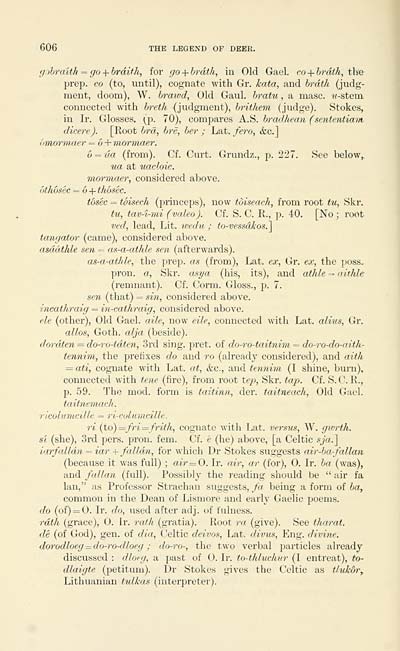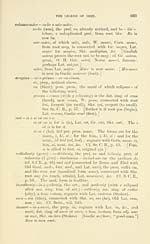Ossian Collection > Reliquiae Celticae > Volume 2
(620)
Download files
Complete book:
Individual page:
Thumbnail gallery: Grid view | List view

606 THE LEGEND OF DEER.
gohraith == go^brdifh, for c/o + brdtk, in Old Gael, co + hrdth, tlye
prep. CO (to, until), cognate with Gr. kata, and In^dth (judg-
ment, doom), W. braivd, Old Gaul, hratu , a masc. ^^-stem
connected with breth (judgment), hrithem (judge). Stokes,
in Ir. Glosses, (p. 70), compares A.S. hradhean ( sententiam
dicere). [Root hrd, hrè, her ; Lat. /ero, &c.]
dmorviaer = t) + viormaer.
6 = da (from). Cf. Curt. Gruudz., p. 227. See below,.
ua at uacloic.
mormaer, considered above.
òthusèc = + thòsèc.
tòsèc = tòisech (princeps), now tòiseach, from root tu, Skr.
tu, tav-i-mi (valeo). Cf. S. C. R., p. 40. [No ; root
ved, lead, Lit. ivedu ; to-vesBàTiOS?\
tangator (came), considered above.
asdàthle sen = as-a-athle sen (afterwards).
as-a-athle, the prep, as (from), Lat. ex, Gr. ex, the poss,
pron. a, Skr. asya (his, its), and athle = aithle
(remnant). Cf. Corm. Gloss., p. 7.
sen (that) = sin, considered above.
incathraig = in-cathraig, considered above.
ele (other). Old Gael, aile, now eile, connected with Lat. alius, Gr.
alios, Goth, alja (beside).
doi'dten = do-ro-tdten, 3rd sing. pret. of do-ro-taitnim = do-ro-do-aith-
tennim, the prefixes do and ro (already considered), and aith
= ati, cognate with Lat. at, &c., and tennivi (I shine, burn),
connected with tene (fire), from root tep, Skr. tap. Cf. S. C. R.,
p. 59. The mod. form is taitinn, der. taitneach. Old Gael.
taitnemach.
ricohimcille = ri-culumcille.
ri (to) =fri = frith, cognate with Lat. versus, W. givrth.
si (she), 3rd pers. pron. fem. Cf. è (he) above, [a Celtic sja.^
iarfalldn = iar + falldn, for which Dr Stokes suggests air-ba-fallan
(because it was full) ; air = 0. Ir. air, ar (for), 0. Ir. ba (was),
and fallan (full). Possibly the reading should be " air fa
Ian," as Professor Strachan suggests, fa being a form of ha,
common in the Dean of Lismore and early Gaelic poems.
do (of) = 0. Ir. do, used after adj. of fulness.
rath (grace), 0. Ir. rath (gratia). Root ra (give). See tharat.
de (of God), gen. of dia, Celtic deivos, Lat. divus, Eng. divine,
dorodloeg =do-ro-dloeg ; do-ro-, the two verbal particles already
discussed : dloeg, a past of O. Ir. to-thluchiir (I entreat), to-
dlaigte (petitum). Dr Stokes gives the Celtic as thikor,.
Lithuanian tulkus (interpreter).
gohraith == go^brdifh, for c/o + brdtk, in Old Gael, co + hrdth, tlye
prep. CO (to, until), cognate with Gr. kata, and In^dth (judg-
ment, doom), W. braivd, Old Gaul, hratu , a masc. ^^-stem
connected with breth (judgment), hrithem (judge). Stokes,
in Ir. Glosses, (p. 70), compares A.S. hradhean ( sententiam
dicere). [Root hrd, hrè, her ; Lat. /ero, &c.]
dmorviaer = t) + viormaer.
6 = da (from). Cf. Curt. Gruudz., p. 227. See below,.
ua at uacloic.
mormaer, considered above.
òthusèc = + thòsèc.
tòsèc = tòisech (princeps), now tòiseach, from root tu, Skr.
tu, tav-i-mi (valeo). Cf. S. C. R., p. 40. [No ; root
ved, lead, Lit. ivedu ; to-vesBàTiOS?\
tangator (came), considered above.
asdàthle sen = as-a-athle sen (afterwards).
as-a-athle, the prep, as (from), Lat. ex, Gr. ex, the poss,
pron. a, Skr. asya (his, its), and athle = aithle
(remnant). Cf. Corm. Gloss., p. 7.
sen (that) = sin, considered above.
incathraig = in-cathraig, considered above.
ele (other). Old Gael, aile, now eile, connected with Lat. alius, Gr.
alios, Goth, alja (beside).
doi'dten = do-ro-tdten, 3rd sing. pret. of do-ro-taitnim = do-ro-do-aith-
tennim, the prefixes do and ro (already considered), and aith
= ati, cognate with Lat. at, &c., and tennivi (I shine, burn),
connected with tene (fire), from root tep, Skr. tap. Cf. S. C. R.,
p. 59. The mod. form is taitinn, der. taitneach. Old Gael.
taitnemach.
ricohimcille = ri-culumcille.
ri (to) =fri = frith, cognate with Lat. versus, W. givrth.
si (she), 3rd pers. pron. fem. Cf. è (he) above, [a Celtic sja.^
iarfalldn = iar + falldn, for which Dr Stokes suggests air-ba-fallan
(because it was full) ; air = 0. Ir. air, ar (for), 0. Ir. ba (was),
and fallan (full). Possibly the reading should be " air fa
Ian," as Professor Strachan suggests, fa being a form of ha,
common in the Dean of Lismore and early Gaelic poems.
do (of) = 0. Ir. do, used after adj. of fulness.
rath (grace), 0. Ir. rath (gratia). Root ra (give). See tharat.
de (of God), gen. of dia, Celtic deivos, Lat. divus, Eng. divine,
dorodloeg =do-ro-dloeg ; do-ro-, the two verbal particles already
discussed : dloeg, a past of O. Ir. to-thluchiir (I entreat), to-
dlaigte (petitum). Dr Stokes gives the Celtic as thikor,.
Lithuanian tulkus (interpreter).
Set display mode to: Large image | Transcription
Images and transcriptions on this page, including medium image downloads, may be used under the Creative Commons Attribution 4.0 International Licence unless otherwise stated. ![]()
| Early Gaelic Book Collections > Ossian Collection > Reliquiae Celticae > Volume 2 > (620) |
|---|
| Permanent URL | https://digital.nls.uk/81694226 |
|---|
| Description | Vol. II. |
|---|---|
| Shelfmark | Oss.288 |
| Attribution and copyright: |
|
| Description | Selected books from the Ossian Collection of 327 volumes, originally assembled by J. Norman Methven of Perth. Different editions and translations of James MacPherson's epic poem 'Ossian', some with a map of the 'Kingdom of Connor'. Also secondary material relating to Ossianic poetry and the Ossian controversy. |
|---|
| Description | Selected items from five 'Special and Named Printed Collections'. Includes books in Gaelic and other Celtic languages, works about the Gaels, their languages, literature, culture and history. |
|---|

